Before bringing any pet home a responsible owner should find out, among other things, the life expectancy of a particular animal or bird. This is just a rational thing to do. You need to be prepared for the time when your beloved pet is about to get old and pass away, especially if you have small children for whom this experience might be rather traumatizing. So, how long do cockatiels live in captivity?
In this article, we are going to talk about cockatiels and their life expectancy in captivity. We are going to cover all the essential factors that might affect the quality of life, including:
- Housing;
- Nutrition;
- Healthcare;
- Physical wellbeing;
- Emotional health.
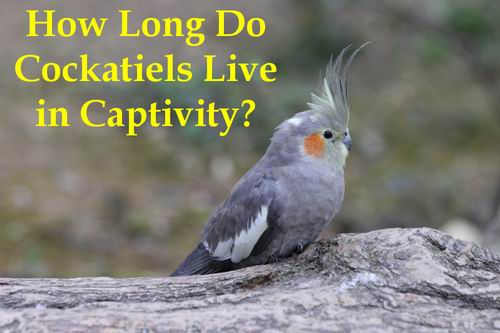
How long do cockatiels live in the wild?
Cockatiels are originally wild birds, indigenous to the Australian continent. Wild cockatiels usually live for some 10 to 14 years. Although pet cockatiels don’t differ much from their wild fellows, their living conditions and thus life expectancy do.
How long do cockatiels live as pets?
Pet cockatiels have much easier lives than wild birds of this same species and can live for almost twice as long.
The average life expectancy of pet cockatiels is 20 years, but some individuals can live for 25 or even up to 30 years and more. That is quite impressive. Although it is genetics and that accounts for such extraordinary cases of longevity. Proper care is very important for a cockatiel’s long and happy life.
Cockatiels depend on the humans they live with. Pet birds cannot procure food for themselves. And have rather limited options for exercise and socialization. That’s why it is so important for us to provide them with the best things they need. The quality of life of these amazing birds is determined by several important factors. What we are further going to discuss in detail.
Nutrition
In wildlife, cockatiels feed mainly on seeds of different kinds and sometimes grass, berries, and leafy greens. Their diet is diverse and naturally balances. The main task of a pet cockatiel owner is to recreate this ration and even improve it. Many owners make a common mistake by overfeeding their cockatiels dry seeds, assuming that those would be the most natural things for them to eat. In fact, cockatiels receive a very small amount of essential nutrients from seeds. Moreover, many store-bought seed mixtures contain too much oily seeds. Which can be responsible for obesity due to high-fat content. So should one leave out seeds whatsoever? Not exactly. In moderate amount seeds are fine, but your cockatiel’s diet should not rely on them.
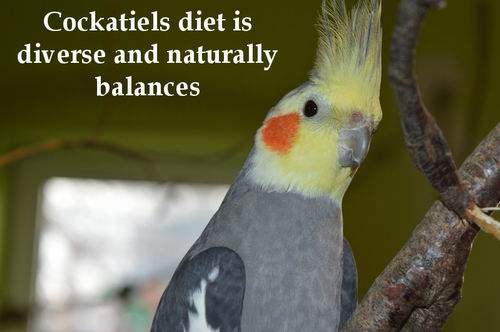
Opinion of experts
Many veterinarians agree that specialized pellets are the best food for cockatiels. Such pellets have well-balanced formulas that contain all the essential micro- and macronutrients, vitamins and fiber. But you should always read the list of ingredients very carefully because some products can contain artificial additives that are always bad for cockatiels.
Fresh food
Just like their wild fellows, pet cockatiels enjoy variety. So it is always a good idea to give your feathery friend some leafy greens, fruits, vegetables (excluding onions, garlic, avocado, and rhubarb), berries, grass or sprouted seeds. It is very important to wash all the products thoroughly and make sure they are free from pesticides before giving them to a cockatiel.
Water
Water is a vital component of a cockatiel’s ration. Birds should have access to fresh water at all times. Make sure to change the water regularly to avoid contamination that might cause poisoning.
Housing
How big of a cage does a cockatiel need? View here! Cockatiels are active birds. Their cages should be large enough to allow them to spread their wings without hitting the bars or other objects. Cockatiels have long tails, so it is essential that the cage is tall enough to provide room for those parts too. The cage should be at least 24” by 24” by 18” (width, heights, depth). But the larger the better. If stuck in a cage where he cannot move freely, your cockatiel will get miserable pretty fast.
Another important thing to consider is the cockatiel cage bar spacing. It should be no more than ½”, otherwise your cockatiel might stick his head between the bars and get seriously hurt or even killed.
When setting up flight cages for cockatiels, you should not forget about furnishing. Cockatiels love perching on things, as well as playing with toys, chewing, swinging and making themselves busy in all kinds of ways. A good cockatiel cage should contain at least one toy and amusement of each kind.
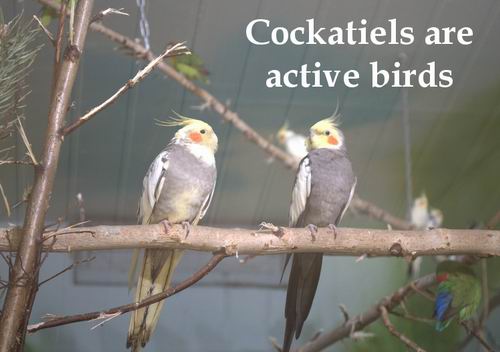
Hygiene
Hygiene is very important for cockatiels. Improper maintenance of a bird’s living environment can cause diseases and shortening of life.
Cell and Accessory Care
Owners need to clean the cages regularly and thoroughly. Especially this refers to feeders and water bowls. They require extra care. Each time you clean a cockatiel’s bowl, you need to make sure it is completely dry before placing it back in a cage. The wet environment can cause mildew and fungus to grow, and that is very bad for your pet cockatiel. Bird excrements need to be cleaned out on a regular basis.
Hygiene care cockatiels
Birds themselves also require hygiene care. You might be surprised, but cockatiels actually do enjoy bathing every once in a while. Although they can clean their own feathers most of the times, they still need some help of humans they live with. Nail trimming is also an important part of a bird’s hygiene, but it should only be done by a professional.
Exercise
Cockatiels can pine away without adequate entertainment and exercise. That, in fact, is true for almost all living creatures. So you need to make sure your pet cockatiel receives enough physical stimulation. Cage toys and accessories are important, but it is vital to let your bid out of the cage every day and allow it to explore the surroundings. Besides, you should introduce new toys to the bird every now and then to provide various activities. In the first place, cockatiels need to have something to exercise their beaks and paws. If your cockatiel’s wing feathers are not clipped, you should allow him to fly around.
Entertaining toys
Even large cockatiel cages can be a poor environment if they lack entertaining accessories. Depending on the size of the cage you can furnish it with several different kinds of accessories. Cockatiel’s favorite toys are those that dangle, rattle, and can be squeezed and chewed on. Needless to say, these toys must be free from harmful substances and small parts that can be accidentally swallowed by a bird.
Socialization
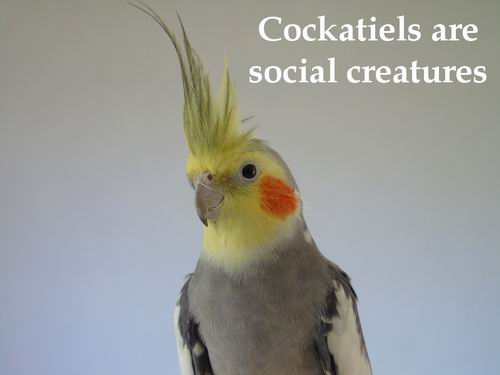
Cockatiels thrive when they can socialize with people or their mates. If a bird stays in a cage without a company for most of the day, it will become lonely and unhappy. That might result in aggressiveness in some cases or apathy in the others. Cockatiels are social creatures and they need someone to bond with. If you have only one bird, the binding partner will be you or some other family member. Birds who live in pairs do not depend that much on humans for their daily portion of socialization. But they still require your attention. For instance, teaching a cockatiel how to talk can be a great bonding experience for both of you. (You should note, though, that only male cockatiels can be trained to talk). You can watch educational videos on how to train a cockatiel to talk on YouTube or consult with your avian vet.
Stress-free environment
Socialization is a very important part of mental health. So do not neglect this aspect of a cockatiel’s live. Another important factor is the stress-free environment. Cockatiels are very sensitive to changes. A new home, a new mate, a different cage or even new toys can frighten a cockatiel. Sometimes stress can be so severe that a bird can get sick and even die. So it is very important to minimize stress for your pet bird. You should introduce any changes very gradually and eliminate potential hazards. Cockatiel needs to feel safe in order to stay happy and healthy.
Healthcare
Proper and timely medical care is a key to your pet cockatiel’s long and healthy life. Unfortunately, birds cannot tell us when something is wrong with them. That’s why we need to observe them carefully and take immediate actions at any sign of deviations from the normal condition.
Disquieting symptoms
So if you notice that your pet bird has suddenly become passive, weak, indifferent or sleepy – these are the signs that something is wrong.
Other alarming symptoms are:
- discharges from a beak or nose,
- swollen and watering eyes,
- limping,
- poor appetite,
- untypical droppings,
- soiled vent,
- sniffing,
- sneezing,
- beak swelling.
Basically, any suspicious deviations from normal behavior and physiology should be a reason to consult with a veterinarian.
Anyhow, it is always better to prevent illnesses than to cure them. So you should take your cockatiel to an avian veterinarian regularly. Better safe than sorry, and when it comes to life and well-being of your pet bird, there isn’t a better principle to live by.
Conclusion
Cockatiels are wonderful birds. They are affectionate, cheerful, funny and intelligent. These birds can become great friends and outstanding life companions. Cockatiels will gladly respond with loyalty and devotion to your loving care. Life expectancy of cockatiels largely depends on the conditions they live in. A balanced diet, sufficient exercise, hygiene, healthy environment and lack of stress are the most important factors that affect a bird’s health. So if you take a proper care of your pet cockatiel, it will stay around to brighten your days for many years to come.



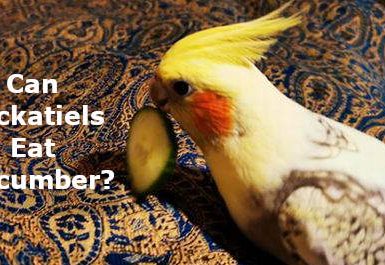
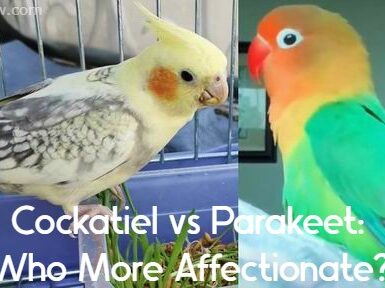
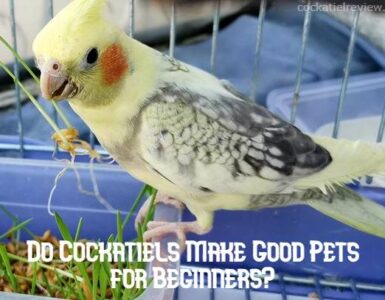
Hi,
I was wondering if cockatiels like to live alone?
Hi Carl,
Generally speaking, cockatiels like companies. And if you only have one bird, you will be keeping them company.
Of course, cockatiel can be alone, but only for a short time, about 6-8 hours. For example, while you are at work or school. With fresh water and a full feeder, of course!
If you are away from home for more than 12 hours, your pet may get bored, and this, unfortunately, can affect behavior and health. In that case, it is better to get either a pair of cockatiels or choose another species.